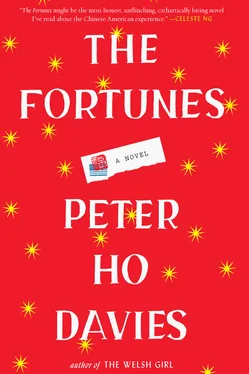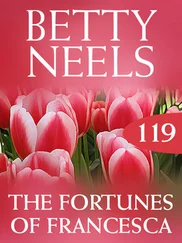And somewhere in there Anna will realize what’s finally made them Chinese American. It’s the revolution, the victory of the Communists over the American-backed government of General Chiang. After which no sojourner can make his fortune on Gold Mountain and take it home. Not if he wants to keep it. They — all of them — are Chinese American now, not just because America has finally, begrudgingly, allowed them to be, but because China has closed to them.
The closest she’ll get is a newsreel…
And yet there in the dreaming dark, watching Madame Chiang waving through the ticker tape, doesn’t she recognize something in the cock of the Missimo’s head, the set of her shoulders, the turn of her wrist? Gestures copied from the movies. Why, that’s me, she’ll think. There I am after all.
Tell It Slant
There was funky Billie Chin and little Sammy Chong…
—“Kung Fu Fighting,” Carl Douglas
Soon it’ll be three decades. A ceremony is planned, a memorial. A plaque to be unveiled. It’s more than a year away yet, but I already have an invitation. To attend, to say a few words, to share my recollections. It’s tucked in the frame of my dresser mirror, his yearbook picture looking back at me. Never forget, it says. Always remember. Keep his memory alive. And at the bottom, in italics: Save the day. A typo, though I must have read it three times before I even noticed. Now it’s all I can think of, that malapropism. Maybe it’s why I’ve not written back yet to decline, as I’ve declined all such invitations for years. It’s a mistake my father might have made, his mother, anyone of their immigrant generation. I wonder if the letter writer is older, or, more likely, someone still hearing an elder’s voice in his head.
In the photo he is still young. In the mirror my face could be his father’s.
What do I remember? What does anyone remember after all this time?
If you remember it at all, if you were around in the eighties, say, what you remember is a Chinese guy being beaten to death in Detroit by two white auto workers who mistook him for a Japanese. This at the height of the import scare, when Japanese manufacturers were being blamed for the collapse of the Big Three U.S. auto companies.
Maybe you remember it happened outside a club where the Chinese guy — actually a Chinese American named Vincent Chin — was celebrating his bachelor party. Maybe you remember he was buried on what should have been his wedding day.
But perhaps you thought it was just an urban legend, a bad joke come to life.
Chinaman and a Jew walk into a bar. They order drinks, get to chatting, then out of nowhere the Jew turns round and sucker-punches the Chinaman.
“What the hell was that for?” splutters the Chinaman, and the Jew tells him, “Pearl Harbor.”
“But that was the Japanese — I’m Chinese!”
“Oy! Sorry,” the Jew goes. “You’ve all got that black hair, those slanty eyes. It was an honest mistake.”
(Stop me if you’ve heard this one before.)
“Well, all right,” Chinaman says, dusting himself off, and they shake, order another round.
Only five minutes later the Chinaman rears back, cold-cocks the Jew.
“What the hell was that for?” the Jew asks, picking himself up.
“Titanic,” Chinaman says sternly.
“The Titanic!” the Jew cries. “That was a fucking iceberg.”
“Iceberg, Goldberg, Steinberg.” The Chinaman shrugs. “Honest mistake!”
Only that night it wasn’t a Chinaman and a Jew, it was two Chinamen, Vincent and me. And it wasn’t a bar but a strip club. And we were with a couple of white friends, Mike and Jerry. But still.
I don’t know about an honest mistake, but it was an easy one. It was dark in there, filmed with smoke, lit only by the snowy static of glitter balls. One of the girls used a fog machine in her routine; another flickered in a strobe. I’m not sure I could have told Chinese from Japanese in that light. But I knew the pair across the stage — one silvering, the other mustachioed — were white. And they knew we weren’t.
He wasn’t a saint, Vincent, though he always figured he might have been named for one. The newspapers all reported he was there for his bachelor party, and sure, that was the occasion, but “bachelor party” makes it sound like a one-off, like we took him there, when it was his idea and a regular haunt of his, his turf . The Fancy Pants Lounge in Highland Park. The girls all knew him; he was a favorite. Contrary to the stereotype — which is why I say it — he wasn’t a eunuch.
The only thing that was different about that night, then? It was supposed to be his last time. He told me his mother had given him the ultimatum ( she knew about the club, his mom, though not his fiancée, Vicki; for her it was almost as shocking as his death). He’d promised he’d quit going after he married. It’s the last time, Ma. I remember because he said she didn’t like that, him saying last time. She was superstitious that way, said it was bad luck. “Can’t win,” is what he shouted over the music, his breath warm in my ear. Me, I didn’t believe him anyway, figured he’d be back the week after the honeymoon.
Maybe I even hoped so secretly. It was the first time he’d asked me along since I moved home after college, my first time ever in a strip club. I’d dressed preppy — pastel polo over khakis and Topsiders. Jerry in his mullet and acid-washed jeans laughed when I got in the car.
“It’s not a disco, man! The girls dance for you, not with you.”
“Ah, lay off him.”
I was working toward my CPA back then. Vincent had come straight from the restaurant, still in his black slacks and white shirt, but he’d slipped on his Members Only jacket. He was riding shotgun, and from the back seat I watched him spread the wings of his collar in the visor mirror to reveal a thin gold chain.
The papers also said what a filial son he was, working two jobs — draftsman by day, waiter by night — to support his poor widowed mother as well as save for his wedding. They made him out to be a model citizen of the model minority. Saint and stereotype. But think. That night he must have had fifty bucks in smoothed-out singles on him—“Tips, baby!”—so what exactly was he working so hard for? Two jobs to pay for two lives, maybe.
So, no saint.
Our generation’s Bruce Lee, someone once called him. Meaning our generation’s tragic martyr. Such an American concept (see Lincoln, Abe; Kennedys, assorted; Doctor King; not to mention James Dean, Marilyn Monroe). But Bruce Lee, for all that he was born in the U.S., always felt more Chinese than Chinese American and was at least as popular with whites and blacks. Plus his death — from an allergic reaction to medication — lacked a bad guy (one reason rumors of triad plots or drug abuse, shades of those old Chinatown evils, abounded).
But now we had our own martyr.
I always wondered how I was supposed to feel about that. I was the friend, after all. Could I have saved him? Should I have died with him? But then he wouldn’t be a martyr, or perhaps we both would be (though martyrs, like all symbols, come best in ones). Instead I was the witness. In all the newspaper accounts, and now online if you care to look it up, “his friend who ran away.”
If you can be a friend and run away.
Without Bruce Lee, though, would two white men have brought a baseball bat to a fight with an Asian? Had they seen his movies? Did they think they were only being smart, evening the odds against some kung-fu fighter? Vincent did look a little like Bruce — that same thick mop of coal-black hair. So did I, for that matter. We didn’t look alike, but we looked like Bruce, more like him than each other, probably. We’d spent our teens practicing his sprung stride and sudden, panting punches, flashing his switchblade smile in the mirror.
Читать дальше












